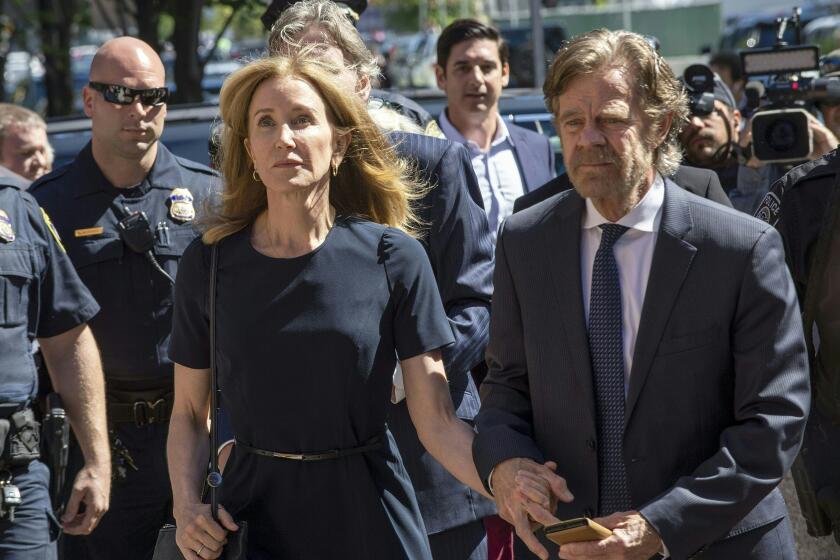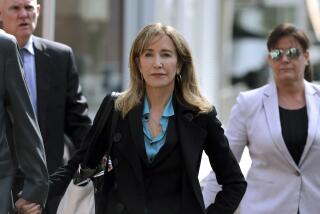Jane Buckingham, parenting book author, gets three weeks in prison in admissions scandal

- Share via
Jane Buckingham, a Beverly Hills marketing executive who wrote a book on parenting before she was arrested and charged with conspiring to rig her son’s ACT exam, was sentenced Wednesday to three weeks in prison.
U.S. District Judge Indira Talwani also imposed a $40,000 fine. After she serves her time in prison, Buckingham will be on supervised release for a year.
Buckingham pleaded guilty in May to conspiracy to commit fraud, admitting she plotted with William “Rick” Singer, a Newport Beach consultant, to have Singer’s Harvard-educated accomplice take the ACT in place of her son. She acknowledged paying Singer $35,000 toward an agreed-upon price of $50,000, with the intention of having her ex-husband pay the balance.
Buckingham appeared in federal court in Boston a day after federal prosecutors brought new charges against most of the defendants in the case who have maintained their innocence, a group that includes actress Lori Loughlin and her husband, Mossimo Giannulli, a fashion designer.
Buckingham is among 19 parents who have pleaded guilty; 15 parents have contested the government’s case and prosecutors are attempting to extradite from Spain a 35th parent accused of conspiring with Singer.
Federal prosecutors accused top CEOs, two Hollywood actresses and others of taking part in an audacious scheme to get their children into elite universities through fraud, bribes and lies.
Before her arrest in March, Buckingham, 51, was best known as a self-described teen trend expert, parlaying her reputed ability to forecast the next season’s hottest brands into her own boutique marketing firm, Trendera.
She is also an author, a federal prosecutor noted in a memorandum filed before her sentencing, having published “The Modern Girl’s Guide to Motherhood” in 2006 and “The Modern Girl’s Guide to Sticky Situations” four years later.
Buckingham’s attorneys had asked that the mother of two be spared prison, punished instead with probation, community service and a fine.
“She knew what she did was wrong, she accepted responsibility for her crime as soon as she was arrested — from that very first day, when she told her children that she would plead guilty — and she continues to demonstrate remorse for what she has done,” they wrote in a sentencing memorandum.
But Justin O’Connell, an assistant U.S. attorney, said that Buckingham was “more deeply engaged in the mechanics of the fraud” than most of the other 10 parents who have so far been sentenced, and should spend six months behind bars.
For years, Hollywood turned to marketing guru Jane Buckingham to find out what kids really want, drawing on her extensive expertise on the youth zeitgeist.
The original plan called for Buckingham’s son to take his ACT exam at a Houston high school, where, according to prosecutors, Singer had bribed a teacher to turn a blind eye to his test-fixing scheme. Singer’s accomplice, Mark Riddell, would correct the boy’s answers after he finished his test.
But two days before the test date, Buckingham’s son came down with tonsillitis.
Buckingham asked Singer in a recorded phone call whether there was any way that Riddell could simply take the test himself, and she could give her son a phony test to fill out at home so he wouldn’t suspect anything was amiss.
“OK, yeah, I guess we could do we could do something like that,” Singer said. The conversation was transcribed in documents filed in federal court.
“I know this is craziness, I know it is,” Buckingham told Singer, according to court documents. “And then I need you to get him into USC, and then I need you to cure cancer and [make peace] in the Middle East.”
Eleven parents, including Lori Loughlin and Mossimo Giannulli, now face an added bribery charge in the college admissions case.
One of Singer’s employees emailed Buckingham an ACT practice test for her son to take at home. Riddell, meanwhile, notched a near-perfect score on the ACT exam.
Singer asked Buckingham to route her $50,000 payment through his sham charity, which would allow her to write it off on her taxes.
“Oh, even better!” she said. She wired Singer’s foundation $35,000, and “tried to have her former husband unwittingly subsidize her crime” by asking Singer’s company to send him an invoice for $15,000, O’Connell said.
Months later, Buckingham told Singer in another recorded phone call that she came home and found a note from her former spouse. “I just found out what you did and I’m so upset I can’t talk about it,” the note read, according to court papers filed by the government.
Buckingham couldn’t think of what he could be referring to, she told Singer, apart from the test-fixing scheme, which was “the only thing kind of shady that I’ve done.”
Singer assured Buckingham he hadn’t told her ex-husband.
“All right,” she said. “So that’s not the horrible thing that I’ve done. Clearly I’ve done something else horrible and terrible.”
Buckingham, O’Connell said in his memo, also inquired about Singer’s “side door” into USC, an athletic recruiting scam that involved misrepresenting the children of his clients as promising recruits for sports they didn’t play and paying off coaches and administrators to endorse their admission.
Buckingham emailed Singer her son’s transcripts, test scores and a picture of him in a soccer uniform, holding a ball, O’Connell said.
“Ultimately,” O’Connell wrote, “Buckingham decided to use her own contacts at USC to pursue admission for her son in lieu of the recruitment scheme.”
Buckingham’s attorneys said those discussions were “limited” and that she quickly decided against pursuing the ruse.
Buckingham was among 33 parents who were arrested the morning of March 12. She fainted, although she later thanked the arresting agents “for their kindness and professionalism,” her sentencing memo says.
She returned home that night after posting bond and told her children she would plead guilty, her lawyers said in the memo. A month later, Buckingham agreed to be interviewed by six prosecutors and FBI agents, the memo says. She answered every question they put to her, her lawyers said.
In a letter to Talwani, Buckingham said she will never forgive herself.
“I committed this crime for myself,” she said. “Not because I wanted my son to go to any particular school, but because I needed to make myself feel like a better mother.”
Buckingham said she was ashamed, embarrassed and regretful of the hurt she inflicted not just on her own children, but those who lacked the legitimate advantages hers enjoyed.
“I know that I can never truly make amends to these other students and families,” she said, “but I will spend the rest of my life trying.”
More to Read
Sign up for Essential California
The most important California stories and recommendations in your inbox every morning.
You may occasionally receive promotional content from the Los Angeles Times.













